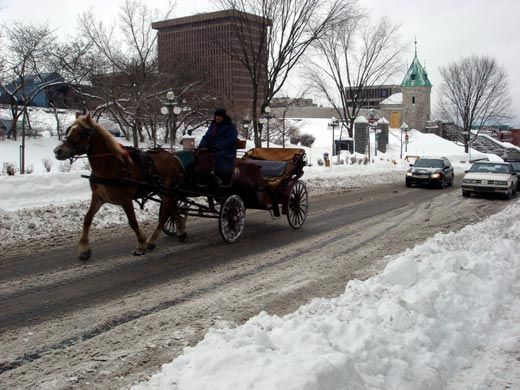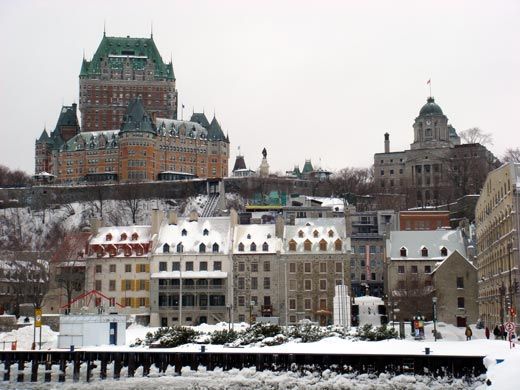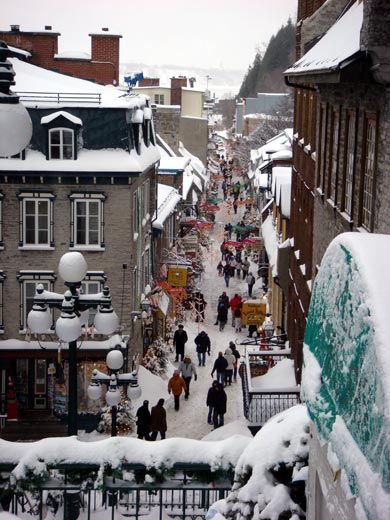Let Me Be Franc
A Look Back for Quebec City’s 400th
/https://tf-cmsv2-smithsonianmag-media.s3.amazonaws.com/filer/quebec_631.jpg)
On July 3, 2008, Québécois will rendezvous with dozens of performers—acrobats, musicians, and even a Samuel de Champlain impersonator—at the Place de l'Assembée-Nationale, the plaza in front of Quebec's Parliament, to wish Quebec City bonne anniversaire on its 400th birthday. Nearby, sleek skyscrapers will tower above new Quebec City, while horses pull carriages over cobblestones behind the turreted walls of Old Town Quebec.
Over the past 400 years, the city (and province) of Quebec has been controlled by France, Britain, and finally Canada. In 1995, a referendum on sovereignty nearly made Quebec an independent nation. Today, as the province faces declining birthrates, its future growth will depend increasingly on foreigners. Statisticians predict that by 2030 immigration may be Canada's only source of population growth. Some Québécois fear that foreign influence will dilute their culture. But a look at history shows that change itself is central to Quebec's identity.
When Samuel de Champlain arrived in July 1608, he declared Quebec the best location for New France's settlement. France's colonization rationale included the old standards—gold, glory and spreading religion—as well as rivalry with the British and a desire for fur.
Throughout the 1600s, the French battled against native peoples, including the Iroquois. Still, Champlain's New France established permanence in the region, even developing a mutually beneficial relationship with the Hurons and Algonkians. In part, the interaction resulted from mutual interest in trade (the canoes and snowshoes of the natives for the copper pots and rifles of the French).
With the next century came continued hunger for territorial supremacy amongst the European powers, which fought across the globe from 1756 to 1763, in what came to be known as the Seven Years' War. In 1759, in the area of old Quebec now known as Battlefields Park, the famous "thin red line" of British troops faced the French and won Quebec City. Both the French Marquis de Montcalm and the British General James Wolfe died as a result of battle, the latter famously learning of his victory just before his demise. In 1763, the Treaty of Paris ended the war and officially granted New France to Great Britain.
Once the British took control of Canada, they feared their subjects would revolt against the new government, and made a point of allowing the French to retain key elements of their society, including their civil code and Catholic practices.
Then, in 1791 the British split the region into Upper Canada, which would be under Anglophone, or British Loyalist, control; and Lower Canada, with Quebec City as its center, for Francophones.
In 1837 and 1838, armed rebels in Upper and Lower Canada revolted unsuccessfully against British rule, prompting Britain to unite Upper and Lower Canada into the Province of Canada in 1841. With the blessing of the British North America Act of 1867, Nova Scotia, New Brunswick, and the Province of Canada (Quebec and Ontario) united to become the Dominion of Canada. Canada added the provinces of British Columbia in 1871, Prince Edward Island in 1873, and Alberta and Saskatchewan in 1905. Increasingly, Canada governed itself; by the late 1920s, Britain had granted Canada autonomous status within its empire.
In the 1960s, after years of Anglophone presence, Québécois felt French heritage was in danger of losing its place in the region. Jarrett Rudy, the Director of Quebec Studies at Montreal's McGill University, describes this era as a time of ubiquitous English language signs, when a person could walk the streets of Montreal or Quebec City and "have no sense that the city was actually dominated by Francophones." Then came 1977's Charter of the French Language, also known as Bill 101, which required the use of French for signs in business, government, and public institutions—or, as Rudy puts it, "This is when McDonald's lost its apostrophe."
Growing separatist sentiment prompted a Parti Québécois-led 1980 referendum on whether Quebec should pursue sovereignty. Around 60 percent of the province voted no. A second referendum in 1995 came much closer to being ratified; 50.6 percent were against, while 49.4 percent were for sovereignty.
Today, there may be less of a sense of urgency about preserving Francophone culture, since younger adults have grown up during a time when the French language dominated the landscape.
This July, Quebec will celebrate its 400th anniversary with a diverse, cheering mix of Canadians in pursuit of yet another new identity.


